EDCC 2025: International SafeAutonomy Workshop
Tabbed contents
Workshop
Welcome and greetings from the organizers
»We are happy to announce our 5th international Workshop on Safe Autonomous Systems.
With the SafeAutonomy Workshop, we want to bring together different groups to create synergies and establish a shared understanding of the "challenges and solutions related to continuous safety assurance of autonomous systems (AS). We welcome you to join the workshop and help in shaping a reference framework for assuring autonomy.
The SafeAutonomy Workshop is co-located with the 19th European Dependable Computing Conference (EDCC) in Lisbon, Portugal from 8th - 11th April 2025.«
Dr. Rasmus Adler and Philipp Schleiß, Fraunhofer
Dr. Richard Hawkins, University of York / Center for Assuring Autonomy
Scope
The Safe Autonomy workshop explores concepts, techniques and technology related to the continuous safety assurance of autonomous systems (AS). Autonomous systems include a wide range of systems such as autonomous road vehicles, autonomous off-road machinery for agriculture or mining, autonomous robot dogs, autonomous drones, autonomous ships and many more. Technology that drives these AS and their capabilities is making significant progress, but safety assurance is lagging and limits innovation of technological advances. Previous workshops focused on the risk management capabilities of AS. This remains an important aspect of this workshop, but we also welcome a broad range of contributions in any related area that push market introduction and innovations by dealing with the safety challenge. AS have enormous potential to transform society. The key trait of AS is their ability to pursue and achieve their goals independently and without human guidance or intervention. In contexts where safety needs to be guaranteed, it is difficult currently to exploit autonomous systems to their full potential due to the difficulty in providing assurance they will be safe throughout operation. The assurance challenge increases when AS take advantage of Machine Learning to cope with the complexity of their mission and the operating context, and when assuring AS in the context of systems of systems where emergent behaviours and dynamic composition must be considered.
The Safe Autonomy workshop will explore a range of topics related to continuous safety assurance of AS including but not limited to:
- Dynamic risk management
- situational awareness
- resilience
- human machine interaction
- uncertainty management
- assurance cases
- virtual validation
- Safety assessment
It invites experts, researchers, and practitioners for presentations and in-depth discussions about assuring autonomy, its relevance for specific use cases, its relation to existing regulatory frameworks and standardization activities, and solutions from systems and software engineering.
Safe Autonomy aims at bringing together communities from diverse disciplines, such as safety engineering, runtime adaptation, predictive modelling, control theory, and from different application domains such as automotive, healthcare, manufacturing, agriculture and critical infrastructures.
Agenda
| 8:30 - 9:00 | Registration | |
| 9:00 - 9:15 | Welcome | |
| 9:15 - 10:00 | Keynote | On the Meaning of AI Safety |
| 10:00 - 10:30 | Presentation (1) | Unified AI-Product Lifecycle Based on Road-Vehicle Safety Standards |
| 10:30 - 11:00 | Coffee Break | |
| 11:00 - 12:30 | Presentation (2,3,4) | A Five-Dimensional Digital Twin Architecture for Real-Time and Non Real-Time Safety Assurance of Autonomous Systems |
| A Dependable Trajectory Prediction Pipeline for Autonomous Driving: Integrating Computer Vision and Bayesian Networks for Highway Safety |
||
| Enhancing Safety and Performance of Autonomous Systems in Open Contexts Through the Layers of Protection Architecture (LOPAAS) | ||
| 12:30 - 14:00 | Lunch Break | |
| 14:00 - 15:00 | Presentation (5,6) | A modular architecture template for resource modeling in Software-Defined Vehicles |
| Bringing independent cybersecurity assessments to space systems' | ||
| 15:00 - 15:30 | Wrap up | |
| 15:30 - 16:00 | Coffee Break | |
| 16:00 - 17:30 | Working Session (optional) | tbd |
| 18:30 | Welcome Reception |
Submission
Accepted workshop papers will be included in the conference Supplementary Proceedings managed by the Conference Publishing Services (CPS) and submitted to Xplore and the CSDL.
All submissions will be peer-reviewed by at least three members of the program committee. They will be evaluated based on originality, contribution to the field, technical and presentation quality, and relevance to the workshop.
All contributions must be electronically submitted through the EasyChair : EasyChair for SafeAutonomy2025.
Paper submission opening |
Dec 20th, 2024 |
Paper submission deadline |
|
Author notification (hard deadline) |
Feb 14th, 2025 |
Camera-ready paper (hard deadline) |
Mar 5th, 2025 |
All dates refer to AoE time (Anywhere on Earth)
The workshop invites submissions in the following categories:
- Regular Papers (6 pages 'everything' included, e.g., figures, tables and references) addresses a research gap and demonstrate how the submitted contribution can enhance the state-of-the-art by advancing current knowledge.
- Short Position Papers (4 pages 'everything' included, e.g., figures, tables and references) articulate a specific viewpoint or stance on a topic, highlighting its significance and proposing new perspectives or approaches to advance the field.
References are included in the page limit for papers submitted to any category. However, after the paper's acceptance, references will not be included in the page limit to enable authors to better address the reviewers' comments.
All submissions will be peer-reviewed by at least three members of the program committee. They will be evaluated based on originality, contribution to the field, technical and presentation quality, and relevance to the workshop.
Submitted papers must be written in English and adhere to the CPS (IEEE) camera-ready two-column format. The submission category must be clearly stated on the first page. Pages must be numbered. Templates and further details can be found here.
Committee
Organizers
- Rasmus Adler (Fraunhofer IESE, Germany)
- Richard Hawkins (University of York, UK)
- Phillipp Schleiß (Fraunhofer IKS, Germany)
Program Committee
- Simon Diemert (University of Victoria, Canada)
- Patrik Feth (NewTec GmbH, Germany)
- Martin Fränzle (University of Oldenburg, Germany)
- Eric Jenn (IRT Saint-Exupery, France)
- Nishanth Laxmann (Fraunhofer IESE, Germany)
- Jose Luis de la Vara (University of Castilla-La Mancha, Spain)
- Thor Myklebust (SINTEF, Norway)
- Ganesh Pai (KBR / NASA Ames Research Center, US)
- Karthik Pattabiraman (University of British Columbia, Canada)
- Ioannis Sorokos (Fraunhofer IESE, Germany)
- Kenji Taguchi (UL Japan Mobility and Critical Systems, Japan)
- Martin Törngren (KTH Royal Institute of Technology, Sweden)
- Ran Wei (Lancaster University, UK)
- Marc Zeller (Siemens AG, Germany)
Proceedings
Accepted workshop papers will be included in the conference Supplementary Proceedings managed by the Conference Publishing Services (CPS) and submitted to Xplore and the CSDL.
Submitted papers must be written in English and follow the IEEE two-column format.
Here is the link for your convenience:
https://www.ieee.org/conferences/publishing/templates.html
The 2024 workshop was in Leuven/Belgium and the Proceedings can be found here.
Review SafeAutonomy Workshop 2024
The 2024 workshop was in Leuven/Belgium and the proceedings can be found here.
Review DREAMS Workshop 2022
The 2022 workshop was in Zaragossa/Spain and the proceedings can be found here.
Review DREAMS Workshop 2021
Videos and recordings of the talks at the DREAMS Workshop 2021

Privacy warning
With the click on the play button an external video from www.youtube.com is loaded and started. Your data is possible transferred and stored to third party. Do not start the video if you disagree. Find more about the youtube privacy statement under the following link: https://policies.google.com/privacyKeynote "Artificial Morality in Dynamic Risk Management for Autonomous Systems" (Dr. Rasmus Adler at EDCC 2021)
In this keynote, the research field of dynamic risk management is structured and viewed in relation to some topics of machine ethics and the ethics of risk. In this context, the Responsive Sensitive Safety Model (RSS) concept is linked to the Situation-Aware Dynamic Risk Assessment (SINADRA) concept.

Privacy warning
With the click on the play button an external video from www.youtube.com is loaded and started. Your data is possible transferred and stored to third party. Do not start the video if you disagree. Find more about the youtube privacy statement under the following link: https://policies.google.com/privacy"Architecture for Situation-Aware Dynamic Risk Assessment" (Jan Reich at EDCC 2021)
The talk is about the architectural building blocks required for performing situation-aware dynamic risk assessment (SINADRA).
If you want to know more about our research on safety topics at Fraunhofer IESE, also check our webpage: Dependable AI

Privacy warning
With the click on the play button an external video from www.youtube.com is loaded and started. Your data is possible transferred and stored to third party. Do not start the video if you disagree. Find more about the youtube privacy statement under the following link: https://policies.google.com/privacy"Handling Uncertainties of Data-Driven Models in Compliance with Safety Constraints for Autonomous Behavior" (Rasmus Adler at EDCC 2021)
This talk is about handling uncertainties of data-driven models with respect to safety constraints such as RSS.
Proceedings and other talks
Other presentations of accepted workshop papers on the topics of “Service-Oriented Reconfiguration in Systems of Systems Assured by Dynamic Modular Safety Cases”, “Behavior Prediction of Cyber-Physical Systems for Dynamic Risk Assessment”, “Autonomic service operation for cloud applications: Safe actuation and risk management”, and “Evaluation of Human-in-the-Loop Learning based Autonomous Systems” were not recorded, so we have to refer to the proceedings.
The presentations and discussions about dynamic risk management for autonomous systems were recorded at an event organized in the context of “The Autonomous”.
Review DREAMS Workshop 2020
Videos and recordings of the talks at the DREAMS Workshop 2020
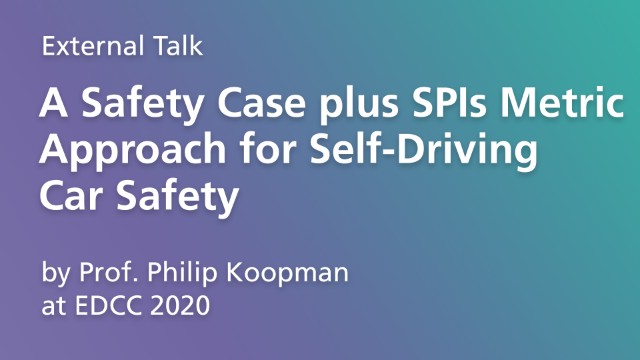
Privacy warning
With the click on the play button an external video from www.youtube.com is loaded and started. Your data is possible transferred and stored to third party. Do not start the video if you disagree. Find more about the youtube privacy statement under the following link: https://policies.google.com/privacyKeynote "A Safety Case plus SPIs Metric Approach for Self-Driving Car Safety" (Prof. Philip Koopman at EDCC 2020)
This keynote talk given by Philip Koopman puts dynamic risk management (DRM) into the big picture of safety assurance for self-driving vehicles. It focuses on the safety case and on monitoring its validity by means of safety performance indicators. DRM relates to the “runtime safety monitor” on slide 14 (minute 27).
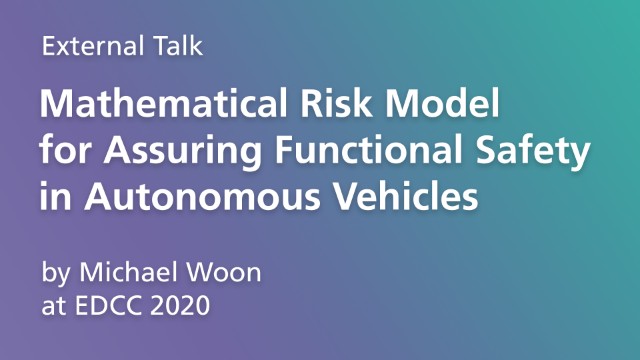
Privacy warning
With the click on the play button an external video from www.youtube.com is loaded and started. Your data is possible transferred and stored to third party. Do not start the video if you disagree. Find more about the youtube privacy statement under the following link: https://policies.google.com/privacyExternal Talk: "Mathematical Risk Model for Assuring Functional Safety in Autonomous Vehicles" (Michael Woon at EDCC 2020)
This invited talk by Michael Woon discusses the realization of dynamic risk management (DRM) for autonomous vehicles.
It is closely related to our research:
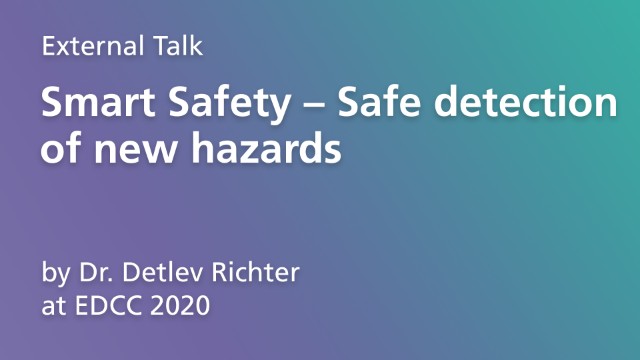
Privacy warning
With the click on the play button an external video from www.youtube.com is loaded and started. Your data is possible transferred and stored to third party. Do not start the video if you disagree. Find more about the youtube privacy statement under the following link: https://policies.google.com/privacyExternal Talk: "Smart Safety – Safe detection of new hazards" (Dr. Detlev Richter at EDCC 2020)
This keynote talk by Detlev Richter from TüV Süd discusses dynamic risk management in the context of smart manufacturing. It highlights the need for dynamic risk management and provides a clear vision for its realization.
The working group for AI in smart manufacturing (of which Detlev Richter and Dr. Rasmus Adler are members) agreed on the need for DRM and a related recommended action was formulated in the upcoming German standardization roadmap for AI.
The safety- administration shells (green boxes at minute 16:30) relate to
Digital Dependability Identities and their instantiation for functions/components/systems in the production domain, like in this success story with Sick AG. This can enable automated risk reasoning in an IT backbone (see
https://www.basys40.de/ and https://www.fab-os.org/).
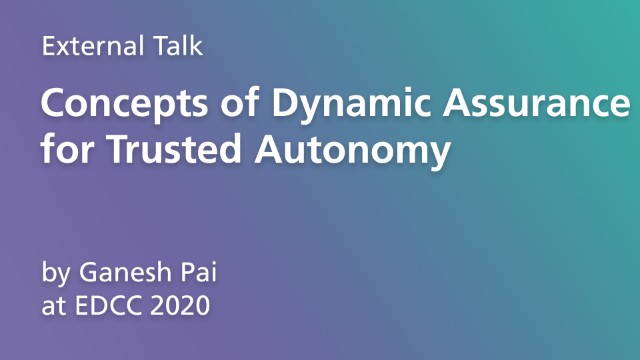
Privacy warning
With the click on the play button an external video from www.youtube.com is loaded and started. Your data is possible transferred and stored to third party. Do not start the video if you disagree. Find more about the youtube privacy statement under the following link: https://policies.google.com/privacyExternal Talk: "Concepts of Dynamic Assurance for Trusted Autonomy" (Ganesh Pai at EDCC 2020)
This invited talk from Pai Ganesh provides an overview of dynamic assurance concepts, and an example of how these concepts can be implemented in aviation. It also refers to several research papers for further reading.
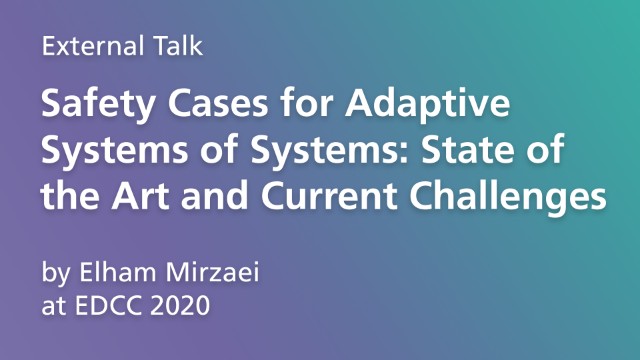
Privacy warning
With the click on the play button an external video from www.youtube.com is loaded and started. Your data is possible transferred and stored to third party. Do not start the video if you disagree. Find more about the youtube privacy statement under the following link: https://policies.google.com/privacyExternal Talk: "Safety Cases for Adaptive Systems of Systems: State of the Art & Current Challenges" (Elham Mirzaei, Carsten Thomas, Mirko Conrad at EDCC 2020)
This paper presentation by Elham Mirzaei focuses on dynamic safety cases. The approach is strongly related to our research basaed on Conditional Safety Certificates (ConSerts) and Digital Dependability Identities.
Dynamic safety cases enable runtime reasoning about the safety of systems/components that are dynamically composed at runtime. It is also the basis for making a composition aware of the current risk as it enables safe shared perception.
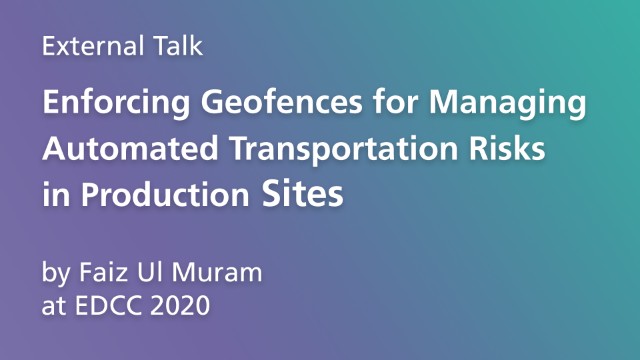
Privacy warning
With the click on the play button an external video from www.youtube.com is loaded and started. Your data is possible transferred and stored to third party. Do not start the video if you disagree. Find more about the youtube privacy statement under the following link: https://policies.google.com/privacyExternal Talk: "Enforcing Geofences for Managing Automated Transportation Risks in Production Sites" (Faiz Ui Muram at EDCC 2020)
This paper presentation by Faiz Ui Muram presents a simulation-based approach for identifying hazards during verification and validation to gain higher confidence in production-side safety. The simulation is done at design-time (during V&V) but the fundamental idea is closely related to runtime-assurance. Furthermore, the paper contributes to the topic of continuous (safety) engineering.
